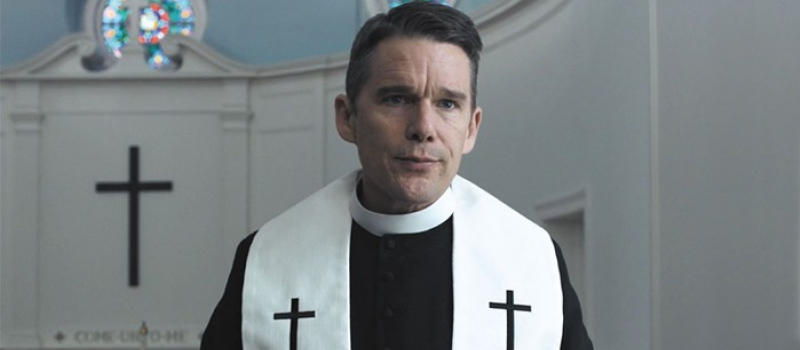I spend a lot of my time in the cinema and consider myself pretty hardened when it comes to long dark nights of the soul, but First Reformed may be the darkest I’ve seen, and one of the most compelling.
Reverend Toller is pastor of the First Reformed Church in Snowbridge, New York – an austere Dutch Colonial-style ghost of a building that in many way resembles the man who has become its steward.
The interior is bright and vacant; unadorned, white-wash. There’s a small gift-shop – well, a couple of shelves at least; small-size shirts remaining only – but the church organ doesn’t work.
Toller himself is an introspective man of faith coiled in guilt and self-doubt. He spends his nights drinking alone and documenting his thoughts in a journal, a self-imposed “experiment” he claims he will not censor. This voice-over brings to mind Robert Bresson’s Diary of a Country Priest, not least in the stomach pains Toller suffers from, though there’s another comparison that seems unavoidable given the filmmaker.
Paul Schrader has spent the past forty years as an auteur in his own right, writing and directing films like Blue Collar, American Gigolo, and Affliction, but remains best known for his early collaboration with Martin Scorsese. As a writer on Raging Bull and Taxi Driver, he provided two definitive takes on toxic masculinity. Toller resembles Travis Bickle in some ways, grown to middle age; wiser, but no better equipped to deal with his own suffering.
Toller’s discernment is honed to a cutting edge that is too often turned inwards. His every interaction laced with self-recriminationl no matter how erudite or considered his response, it’s not enough.
He seems at least content in his misery, though. That is until a young, pregnant woman in his congregation, Mary (Amanda Seyfried), asks Toller to counsel her husband, Michael (Phillip Ettinger). Michael is an environmentalist tormented by mankind’s irreversible destruction of the planet and the prospect of bringing a child into it. He has a strip of wall dedicated to photos of those who’ve died for the cause.
Michael’s situation forces Toller to wrestle with his own beliefs, about suicide and despair, but their discussion takes on a new dimension when Mary discovers a home-made suicide belt in their garage.
First Reformed is as an icy study of despair born of belief, Schrader’s most overt since Dominion: Prequel to the Exorcist. In that regard, it’s much like Scorsese’s most recent work, last year’s Silence. Where that film dealt with the arrogance of true, unquestioning belief, here the key theme would seem ambivalence: that of a man torn between intellectual self-damnation and the remotest possibility of salvation.
This is encapsulated in a single image: Gaviscon, misty and tumorous, in a glass of whiskey – poison and medicine curdled together. The irony, the tension, drive Toller towards radicalization and self-destruction.
He hates himself for his romantic entanglement with Esther (Victoria Hill), employee of the mega-church Abundant Life. She’s concerned about his well-being, as is Abundant Life’s pastor, Jeffers (Cedric Kyles). However, the 250th anniversary of the First Reformed Church is coming up and Toller is due to take part in the reconsecration ceremony, a ceremony being bankrolled by mass polluter Balq Industries.
And so, plunging down a hole of recrimination online research, Toller discovers Michael’s cause becoming his own – what Schrader has called “the virus of suicidal glory.”
Pinched, sincere, and deeply uneasy, as Toller, Hawke gives a performance that equals any in an already remarkable career (particularly Boyhood and the Before trilogy). He perfectly conveys Toller’s internal tension, his unhappiness, and desire for catharsis, which drive him slowly on towards self-radicalization and self-destruction.
Schrader shoots the film with a formality and simplicity, lent to by the square academy aspect ratio; far more effective than the stylistic grab-bag with which he overloaded us in his most recent work, Dog Eat Dog. The opening credits – white cursive lettering on a dark background, the church dimly visible as if behind a veil – there’s the sense of repression, like a Transcendental Rebecca.
Because of this one magical realist sequence, the “Magical Mystery Tour”, is transcendent as much as it is hokey; though becomes increasingly nightmarish as natural beauty gives way to man-made devastation.
Despite having written a book on it all the way back in 1972, this is Schrader’s first venture into Transcendental cinema – cinema that is designed to communicate directly with shared human experience.
I’ve read too little Kierkegaard and no Thomas Merton, the Trappist monk with whom Toller feels a kindship (his book is one of the few to occupy the sparse, almost barren rectory), to put my finger on the theologic implications, but the ambiguity of the film’s climax, by turns harrowing ecstatic, resonates with something deeply spiritual, deeply human.
It left me physically shaken in a way that few films ever had, burrowing down to some inner part of my psyche. First Reformed is not a film I can, in good conscience, recommend to anyone suffering from mental health issues. As a work of cinema, though, it is astonishing.
